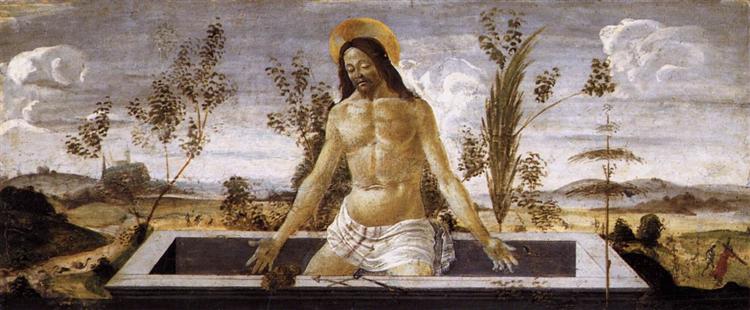Description
The work "Christ in the sepulcher" by Sandro Botticelli, dated in 1488, evokes a deep review of sacrifice and redemption within a visual framework that reflects the emotional and spiritual complexity of the represented moment. Botticelli, known for his distinctive style that combines the divine and the human, presents in this painting an interpretation that is both gloomy and reverent, leaving a lasting impression on the viewer.
In the center of the composition, the body of Christ lies on a grave, encapsulated in an environment of serenity and pain. His posture, with a slightly arched torso and extended arms, suggests both the fragility of the flesh and the majesty of his sacrifice. The representation of the body is remarkable for its elegance, a characteristic feature of the style of the Renaissance that Botticelli dominated. The treatment of the body of Christ manifests, through the delicacy of the forms and subtlety of the contours, the duality between suffering and glory.
The use of color in this work is essential to transmit the desired atmosphere. The palette of targets off, dominated by soft shadows and terrible tones, helps to create an atmosphere of intimacy and melancholy. The dark background highlights the figure of Christ, raising it and focusing the viewer's attention on his suffering. This chromatic choice is also a reflection of the artistic production of the period, where sober tones sought to emphasize the seriousness of the issues addressed.
Interestingly, "Christ in the sepulcher" is located within a broader context of Botticelli works that explore Christian spirituality. paintings As "Spring" and "The Birth of Venus" show their mastery in the representation of beauty, but this particular work goes into a more gloomy and contemplative aesthetic, resonating with the devotion of their time and influencing religious art later. The theme of death and resurrection, so emblematic in Renaissance art, is here treated with a palpable humanity, inviting the viewer to a deep reflection on life, death and what follows.
Although "Christ in the sepulcher" presents a more melancholic treatment, he shares similarities with other works of the same era, where the figure of Christ in his suffering is a recurring reason. This representation, with its strong emotional burden, becomes a medium through which Botticelli not only reiterates the Christian message, but also establishes a strong emotional bond with the observer.
In short, Botticelli's work is a testimony of both his technical ability and his deep understanding of human psychology. Through the use of the form, color and composition, it manages to capture the spirit of an era in which art not only served as a vehicle of worship, but was also a means to explore the depths of human experience. "Christ in the grave" remains a masterpiece that, despite its formal simplicity, loads with a thematic complexity that continues to resonate in the modern spectator, challenging him to contemplate the eternal.
KUADROS ©, a famous paint on your wall.
Hand-made oil painting reproductions, with the quality of professional artists and the distinctive seal of KUADROS ©.
Reproduction service paintings With a guarantee of satisfaction. If you are not completely satisfied with the replica of your painting, we refund your money 100%.

